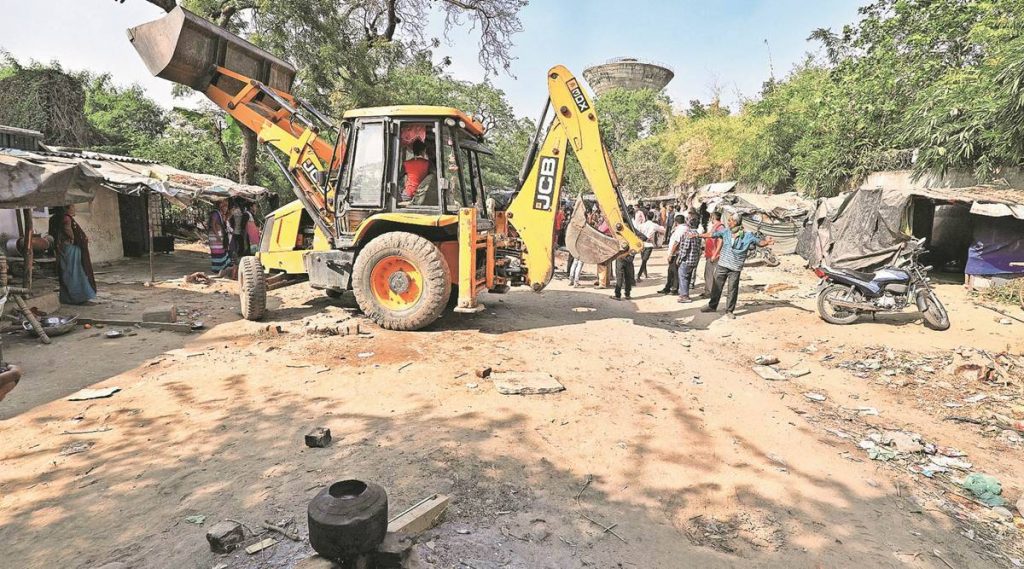The Ahmedabad Municipal Corporation (AMC) and officials from the Ahmedabad district collectorate had to postpone an eviction drive of nearly 55 hutments and slum dwellings from a land parcel that will be part of the Gandhi Ashram Precinct Development Project on Tuesday due to resident protests.
After slum dwellers, including women and children, sat outside their hutments in protest, police in bulletproof vests, an ambulance, police jeeps, and a JCB machine, along with officials from the AMC and the district collectorate, made a retreat, aided by civil society organisations such as the Mazoor Adhikar Manch.

Following negotiations and requests, deputy collector JB Desai assured residents that they would be given a week to make arrangements and that the officials in charge of the eviction would return at 10 a.m. on November 30.
On November 20, the residents were told orally to vacate the plot, with no written notice from the AMC or the district collectorate’s office.
According to a survey of the inhabitants conducted by the trade union Mazoor Adhikar Sangh, some of the slum-dwellers lived at the location prior to 2010, with the majority of the dwellers being notified tribes and denotified tribes.
On November 11, Ramesh Srivastava, an executive committee member of the Manch, made a representation to the Ahmedabad collector, the Ahmedabad municipal commissioner, and the deputy municipal commissioner, requesting rehabilitation in accordance with existing government policy.
“According to the Regulation for the Rehabilitation and Redevelopment of Slums 2010, at least 80% of these residents are eligible for rehabilitation.” They should ideally be eligible for rehabilitation through the Gandhi Ashram Development Project as well, but even if the latter does not apply, the former does. “The eviction is being carried out in complete disregard for due process,” Srivastava stated.
According to deputy municipal commissioner IK Patel, because the land is not owned by the civic body and the state government, the residents will not be eligible for the civic body’s slum rehabilitation policy.
Deputy collector JB Desai, who is the member secretary of the eight-member coordination committee constituted to rehabilitate residents of the Ashram properties, said that those being evicted do not count as Ashram residents and are “encroachers” on government wasteland and thus “do not require to be given notices”.
The plot of land will be used for one of the internal roads that will be part of the Ashram Precinct Development Project, Desai said adding, “Ashram residents are (considered as those who are) tenants of the (six) trusts. Only tenants of the trust are eligible for resettlement or rehabilitation and there must be a document agreement (such as a rent agreement, as proof of their tenancy) with the trust.”
According to Dhimant Badhiya, an Ashram resident and member of the coordination committee, 121 “Ashramites” have accepted compensation money and 20 other “Ashramites” have agreed to be rehabilitated at an alternative site.
The Mazoor Adhikar Manch intends to make representations to the municipal commissioner and the executive council of the Ashram Precinct Development Project after receiving a week’s notice, as well as “move the Gujarat High Court if necessary,” according to Srivastava.
On Tuesday, Tushar Gandhi, Mahatma Gandhi’s great grandson, issued a statement opposing the eviction, stating, “Saving and safeguarding the rights to shelter of these poor people is more important than saving the Sabarmati Ashram… It is entirely non to use the excuse of redeveloping Bapu’s Ashram to evict the poor and leave them homeless.
If Bapu had originally described a country that would protect the rights of the daridranarayan (service to the poor is equivalent in importance and piety to service to God), he would have been vehemently opposed to adding to the misery of the poorest of the poor and the weakest of the weak in his name.”



